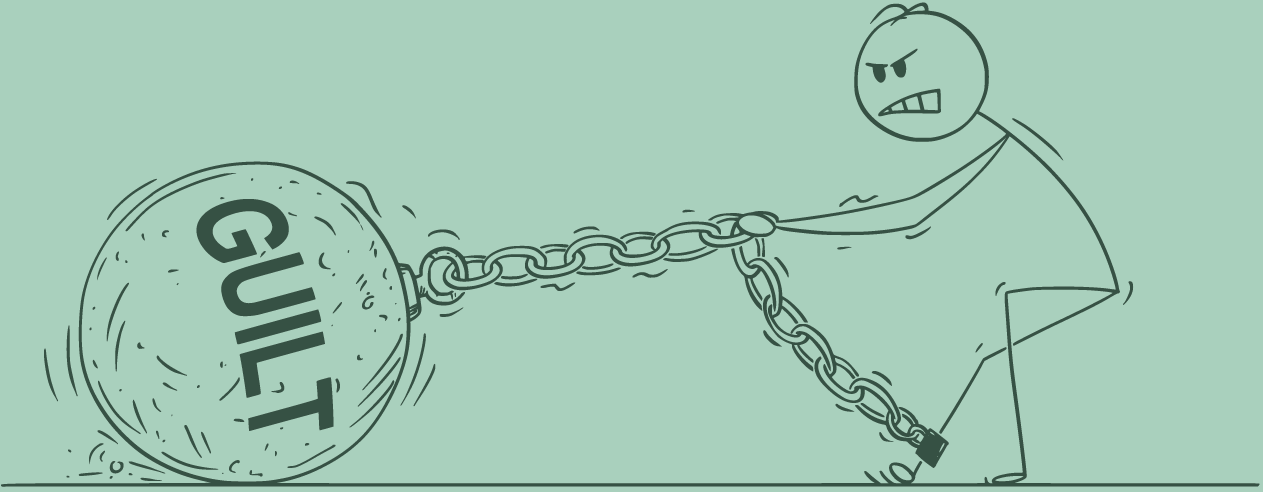Guilt is an emotion we often push into the shadows. In my latest podcast, I discuss why we experience disability guilt, its detrimental effects on our well-being, and effective strategies for managing it. As someone living with a disability, I understand the unique layers of guilt that accompany not being able to do the things I used to be able to do.
Living with a disability may mean guilt over what we can’t do and the impact our condition has on those around us. The inability to work, the reliance on disability benefits, and the financial strain of medical bills can weigh heavily during a period where you may be denied benefits unnecessarily. We can feel justified frustration and that we’re not contributing enough to our households or relationships. This overwhelming guilt is compounded by those unfair battles with insurance companies, which can make us feel even more helpless. It’s critical to remember amidst the turmoil of emotions that our disabilities are not our fault.
Disability Guilt And Your Body
Guilt can wreak havoc on both our mental and physical health. It can manifest in various ways, including difficulty sleeping, muscle tension, digestive issues, anxiety, and depression. These symptoms can create a vicious cycle, where physical discomfort exacerbates emotional distress and vice versa.
Recognizing the source of our guilt is the first step towards addressing it. For instance, when I feel too unwell to make dinner, I experience guilt. Not only am I unable to contribute financially as I did before my stroke, but I also can’t contribute physically. This imbalance makes me feel guilty, but I’ve learned to express these feelings out loud. Simply voicing my guilt initiates a conversation that often leads to reassurance and understanding.
Strategies To Combat Disability Guilt
Disabilities are not a choice; they result from events or conditions beyond our control. Instead of blaming ourselves, we need to practice self-compassion. How would you treat a friend or family member in the same situation? Likely with much more kindness and understanding than you show yourself. Try looking in the mirror and saying, “I love you.” It might feel awkward, but it can unlock an unexpected feeling of self-acceptance. If you catch yourself in self-blame, repeat this exercise.
Reframing our thoughts is another essential strategy. Instead of thinking, “I should be able to work a full-time job,” try focusing on what you can do: “I am able to contribute by taking care of the dogs, doing my podcast, and managing the house when I feel well.” Appreciate your abilities rather than criticizing your limitations.
If you feel guilty asking for help, imagine the roles reversed. You would likely be happy to help a loved one and wouldn’t want them to feel guilty. Be appreciative and kind because the person helping you probably feels good about being able to assist. So why should you feel bad? Don’t steal away their ability to feel the reward of being of service.
Remind yourself that you are doing the best you can. This mindset can provide immense relief. We are all doing our best with the cards we’ve been dealt, and that’s enough.
If guilt persists and negatively impacts your mental or physical health, seek help from a therapist or psychiatrist. They can help you identify the root of your guilt and develop strategies to cope with it.
Lessons From Sobriety
In sobriety, I was told that I would be amazed before I was halfway through the steps of AA, and it’s true—my serenity is more accessible every year. Last year, I realized that my self-love had grown significantly. I’m not trapped in unhealthy thinking patterns, and I need to apply this same principle to my stroke recovery.
I have chronic pain and constant worry about tasks, productivity, pain management, and maintaining strong relationships. I’ve felt anxiety, grief, loneliness, and guilt due to my disability. Feelings are essential; they help us process life. We need to acknowledge them without letting them control us.
In sobriety, we talk about willingness versus self-will. Willingness means being open to accepting help and acknowledging our limitations. Self-will is trying to power through on our own, often leading to more stress and guilt. Embracing willingness in my stroke recovery means accepting the support available to me and being kind to myself.
If you’re struggling with guilt due to a disability, remember that your disability is not your fault. You’re doing the best you can, and that’s enough. Reflect on what triggers your negative thoughts, reframe them (even if it uncomfortable or feels like lying to yourself), and seek professional help if needed.
Let’s commit to self-kindness and embrace the freedom that comes with it.

